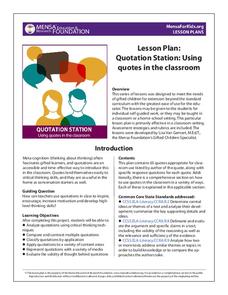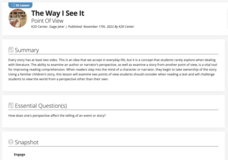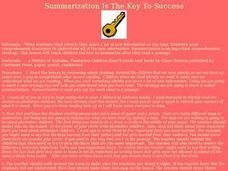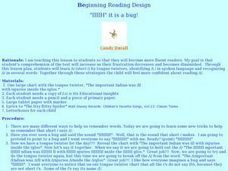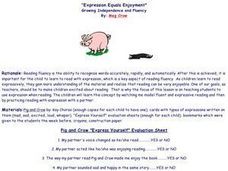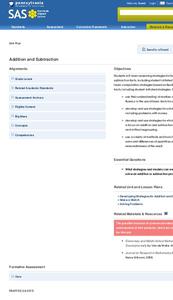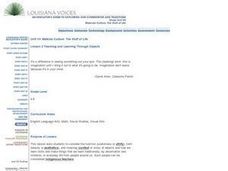Google
Intermediate 4: Searching for Evidence for Research Tasks
Online resources take many forms: blogs, search engines, news websites, documents, wikis. In order to conduct effective research, pupils should become familiar with different formats so that they can more easily choose suitable sites for...
MENSA Education & Research Foundation
Hurricanes
Learn the ins and outs of hurricanes through a series of lessons answering, "What is a hurricane? How does it travel? How is one formed, measured, and named?" Information is presented through informative text and images, while...
MENSA Education & Research Foundation
Quotation Station: Using Quotes in the Classroom
An informative list compiled with quotes, authors, and discussion questions, along with 20 out-of-the-box application ideas, make up the collection of lessons geared to spark dialogue and creative thinking about quotations.
ReadWriteThink
A Picture's Worth a Thousand Words: From Image to Detailed Narrative
A picture's worth a thousand words—and even more inspiration! A visual activity uses photographs to inspire writers. The process teaches aspects of narrative writing, such as point of view and characterization.
EngageNY
Introducing “Comprehending the Calamity”
Some things are beyond comprehension. Scholars read an excerpt from "Comprehending the Calamity," a primary source text about the 1906 San Francisco earthquake. After identifying the gist, pupils complete anchor charts to analyze how the...
EngageNY
Finding the Gist of the Immediate Aftermath: Excerpt of “Comprehending the Calamity”
Brace for the aftershocks! Scholars read an excerpt from a primary source document about the immediate aftermath of the 1906 San Francisco fire and earthquake. Next, pupils complete an anchor chart, analyzing how the author introduces,...
EngageNY
Mid-Unit Assessment: On-Demand Note-taking and Text-Dependent Questions
Flex those brain muscles! Scholars take a mid-unit assessment, conducting research to take notes about how a particular invention helped meet society's needs. To complete the test, they work on draft sketches for their graphic...
K20 LEARN
The Way I See It: Point of View
Robbers see a house from a different perspective than real estate agents. That's the big idea in a lesson about point of view. Groups assume the role of either robbers or real estate agents, note important details in a description of a...
Curated OER
Summarization Is The Key To Success
Fourth graders exercise the strategies of silent reading and summarization to acquire new and important information from a text. They silently read and summarize page eighty-two in their "A History of Alabama" books. A review of...
Curated OER
"IIIIH" it is a bug!
Students practice the long and short vowel sounds of /i/ in a variety of text with assessing different strategies. They utilize tongue twisters to assist them including "The Itsy Bitsy Spider" and "Liz is Six." Letterboxes are also...
Curated OER
Take One
Students review strategies used to read unkown words. They listen as the teacher reads sentences using a variety of reading fluencies and expressions. They read assigned parts of the play, "Peddler Polly and the Story Stealer" by Aaron...
Curated OER
Speedy Readers
Students practice reading a poem, "It's Raining Said John Twaining," by, N.M. Bodecker Athenuem, to assess a variety of strategies to maintain what they have read as well as speed up their reading paces. They keep a record of how fast...
Curated OER
"Expression Equals Enjoyment"
Students practice strategies to become more fluent readers with expression. They observe the teacher modeling fluent and expressive reading of the book, "Pig and Crow," by Kay Chorao and then model what they've observed with expression...
Curated OER
Model Lesson Plan
Students, five of the "best" readers in the class, get a script and read over their part of the lesson before they begin to "teach" the class.
Curated OER
Sensational Summarizers
Students study strategies that aid comprehension. They focus on the main ideas of a passage and eliminate unnecessary and repetitive information. They substitute super ordinate terms for a list of items and create a topic sentence.
Curated OER
Addition and Subtraction
Students develop their own strategies to solve basic addition and subtraction facts. In this addition and subtraction lesson plan, students use strategies they already know and new ones to solve problems.
Curated OER
Skating on Thin Ice
Young scholars read an article describing a controversial new theory for treating anorexia nervosa, research other eating disorders, simulate case studies and suggest possible treatment for these cases.
Curated OER
Get Smart
Students discuss the definition of intelligence and the possibility of measuring intelligence. They consider the elements of intelligence by reading and discussing the article "'Jeopardy' Millionaire is Smart, but Is He a Genius?They...
Curated OER
Casting a Wide Net
Learners investigate topics that would be suitable for classroom podcasts. They read an online article, write and produce a podcast.
Curated OER
Teaching and Learning Through Objects
Students identify and interpret the function, usefulness or utitlity, form, beauty or aesthetics, and meaning, context or story, of objects and how they learn new skills and make things that they learn traditionally, by observation and...
Curated OER
Introduction to Edgar Allan Poe
Before reading Edgar Allan Poe's "The Raven" in your class, walk learners through this scavenger hunt that teaches them about Poe's life and works. Though the lesson is designed for 15:1 special education class, it could work in any...
Curated OER
Irony in Poetry and Prose (Fiction and Non-fiction Texts)
Middle and high schoolers examine the impact of irony in poetry and prose. In this figurative language lesson plan, they read instructor-selected literature and identify uses of irony. Then they discuss how irony enhances literature.
Virginia Department of Education
Scientifically Speaking
Explore the connection between operations with scientific notation and the laws of exponents. Scholars work on a set of word problems involving operations with scientific notation. Along the way, they consider how the laws of exponents...
Curated OER
Putting Reading first: Keys to Comprehension
Second graders recognize what comprehension is and can explain the strategies they are using. In this reading comprehension lesson, 2nd graders self assess the strategies they are using to comprehend a text. Students answer...


